No Fixed Narratives: Bassist James Ilgenfritz at Kerrytown Concert House
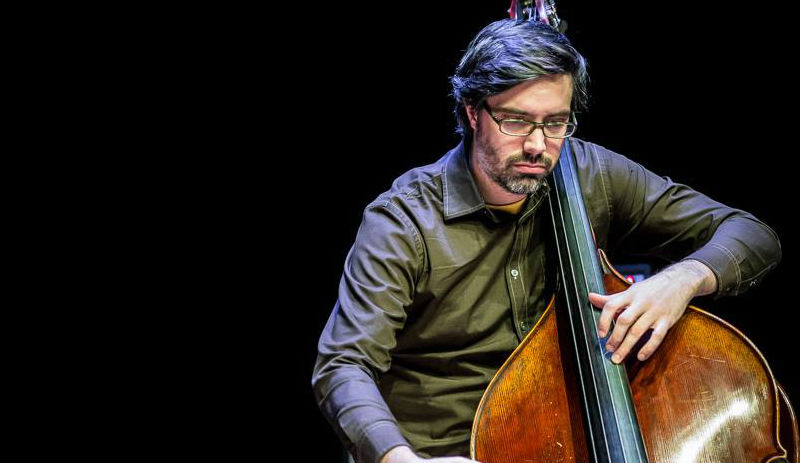
Whether he's reframing William S. Burroughs' cut-up prose as opera with his long-running Anagram Ensemble, fusing progressive rock riffing with avant-jazz in electric trio Hypercolor, or bowing his strings with multiple bows and springs on his own, bassist James Ilgenfritz is regularly questioning perceptions and pushing back against sound barriers.
"Music is a fundamentally abstract art form, as it does not have the type of figurative quality words or images can communicate," Ilgenfritz wrote in an email, describing what inspired him to transcribe the work of composer and saxophonist Anthony Braxton for his 2011 debut solo album, Compositions (Braxton). "But we often give in to the temptation to shoehorn music into fixed narratives and the illusion that meaning can be an absolute."
The Brooklyn, New York-based musician grew up in Monroe and studied music at the University of Michigan. He played with several Ann Arbor and Detroit-based groups, including Bill Brovold's experimental rock troupe Larval, before moving out of state to further his musical path.
In January, Ilgenfritz led a string section playing arrangements he'd written for composer and performer M. Lamar's Funeral Doom Spiritual in Brooklyn. The new monodrama written by Lamar with musician Hunter Hunt-Hendrix (of "transcendental" metal band Liturgy) takes place in the future and "explores radical historical expressions and futuristic longings for destruction of the white supremacist world order."
This month, Ilgenfritz is releasing his second solo album, Origami Cosmos (Infrequent Seams), featuring four new solo works for bass written for him by four different New York composers.
On Wednesday, March 15, Ilgenfritz will give a solo contrabass performance at Kerrytown Concert House featuring music from his new album, his Braxton transcriptions, and an old favorite from his Ann Arbor days by a U-M professor.
Tools Crew Live: Bill Van Loo
Downloads:
➥ MP3 for "A Night at the Library"
➥ 720p video, 480p video or 240p video
Bill Van Loo is a polymath.
“The description I use to describe to people what I do is I’m a maker, teacher, musician, and photographer,” he said, “and at any given point in my life, one or more of those areas is going to be more prevalent or in the forefront than others.”
In the late ‘90s and early 2000s, Van Loo was part of the Detroit techno scene, including performing on the Underground Stage in 2000 at the first Detroit Electronic Music Festival, the now-legendary electronic-music event now known as Movement. He released most of his music on his own chromedecay label, and was part of a collective called Thinkbox, which created audio-visual multimedia performances and performed at the Movement Festival in 2003 and Montreal’s huge Mutek fest in 2004.
But for much of the past decade-plus, Van Loo has focused on his teaching career. He’s currently the technology, engineering, and design educator at A2 STEAM, the three-year-old K-8 school that has a heavy focus on project-based learning and tech. At the end of 2016, Van Loo finished his master’s degree in educational media and technology from Eastern Michigan University -- and suddenly found himself with enough free time to bring music to the forefront once again.
Van Loo’s currently working on new material in his home studio and hopes to release an EP or mini-LP on Bandcamp in the spring. We took advantage of Van Loo's sudden return to music by having him be the featured artist in our second Tools Crew Live video series where we have musicians use gear from the Ann Arbor District Library's Music Tools collection to create jams. (Fred Thomas was our first artist, which you can view here.)
Van Loo recorded the videos on January 3 and on February 16 we talked about the songs he performed -- one techno banger, one ambient guitar bliss-out -- and the gear he chose.
Sisters and Saxophones: Tristan Cappel's debut, "Deadbird," was a lifetime in the making

Tristan Cappel may have never picked up the alto saxophone were it not for his sister.
“My sister is four years older and I always looked up to her growing up, following in her footsteps in any way I could,” said the 21-year-old junior at the University of Michigan. “In 5th grade, band class was an option at my elementary school and my sister, who also played clarinet in the band, urged me to join and play saxophone. Wanting to be like her, I did.”
If you consider the long tail of her influence, his sister's encouragement all those years ago is ultimately what lead to Cappel making his debut album, Deadbird. The LP features eight original jazz compositions by the native of Sterling Heights, Michigan, all composed between ages 17 to 20. He recorded the album at U-M's Duderstadt Center studio and mixed the album himself.
Cappel’s alto sax sound is dry and lean, filled with rhythmic attacks as much as harmonic exploration. His bandmates do a great job of dipping into the avant-garde without falling into wholesale honking, in large part because they don’t need to play extreme for Cappel’s catchy songs to sound edgy as well. His compositions allow plenty of space for rhythmic interplay and chromaticism while maintaining a solid base of hooks and beats that quickly rope listeners into his sound world.
Cappel celebrates the release of Deadbird with a show at Canterbury House on Saturday, March 11. We emailed with the multitalented altoist, who gave long, thoughtful answers to our questions. At the end of the interview, you can stream Deadbird and read Cappel's track-by-track tour of the album.
Wild Swan Theater's family concert truly is "An Afternoon of Ann Arbor’s Best" -- and its plays are pretty fun, too
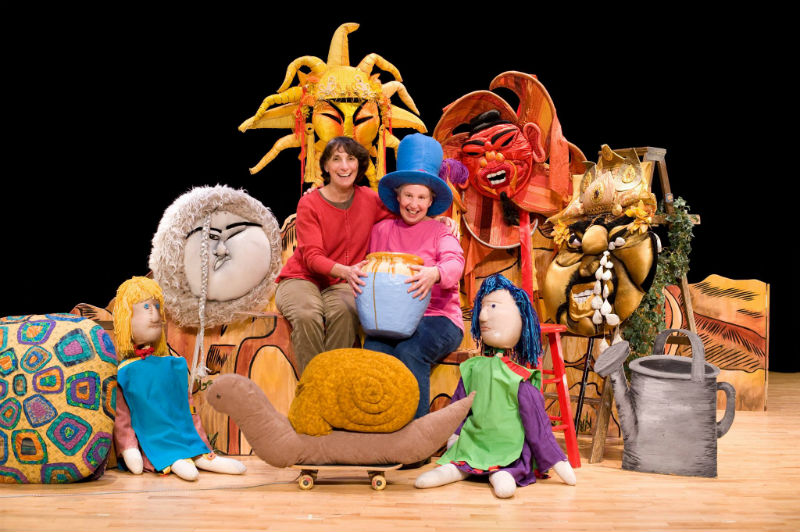
Sandy Ryder represents some of the best things about Ann Arbor. She's someone who came to town for school, never left, and then went on to create businesses and good works that she has generously shared with the community for decades.
After graduating from the University of Michigan with a degree in theater, Ryder taught, worked as a clown and a mime, and did improv with a children’s theater group. In 1979, she started Say Cheese Cheesecakes bakery (which closed in 2006 under different owners). Then in 1980, she cofounded Wild Swan Theater with Hilary Cohen.
Over the past 27 years, Wild Swan has distinguished itself as a place for all people, especially children with disabilities.
“My favorite thing is to have everything accessible -- workshops, traveling shows, everything," Ryder said. "We have ASL shadowed into the show, kids with visual impairments can come to a touch tour on stage. Everyone can share the experience together, everyone can enjoy the play.”
Multiple Personality Music: Lake Street Dive at the Michigan Theater

“We’ve been in Ann Arbor before!” announced Rachael Price, lead singer of Lake Street Dive, at the band’s performance Wednesday night at the Michigan Theater. “We played The Ark way back when -- was anyone here at that show?” One or two members of the crowd hooted. “That seems about right,” said Price with a laugh. “Because that’s about the number of people who were at that show.”
Since then, Lake Street Dive’s star has risen rapidly. The four-member band filled the Michigan Theater, and Lake Street Dive has been touring almost constantly for the past year and a half, simultaneously promoting its acclaimed 2016 album, Side Pony, and bringing some of their overlooked older work back to the stage.
Comprovisation: Julian Lage and Chris Eldridge Live at The Ark
Guitar maestros Julian Lage and Chris Eldridge gave Ark-goers a show to remember on February 27, deftly weaving a rangy array of influences into a coherent and lively musical conversation.
Equally at ease in the company of jazz greats (Gary Burton, Fred Hersch) and bluegrass luminaries (Béla Fleck, David Grisman), Julian Lage continues to cover new ground while honoring the traditions that have informed his evolution as a musician. Chris “Critter” Eldridge is no slouch either, having cut his teeth on the national stage with The Seldom Scene and the Infamous Stringdusters before bringing his nimble and artful guitar work to the inventive, genre-bending Punch Brothers.
While much of the duo’s 2015 effort, Avalon, featured Eldridge’s vocals, their latest, Mount Royal (released last week) carves out more space for the interplay between the voices of their vintage Martin guitars. This heightened focus on instrumental improvisation, evident in concert, was a key driving force behind the songwriting process for the new album, which Lage and Eldridge discussed in greater detail with Pulp last week.
Swing Easy: Tenor Saxophonist Harry Allen at Kerrytown Concert House
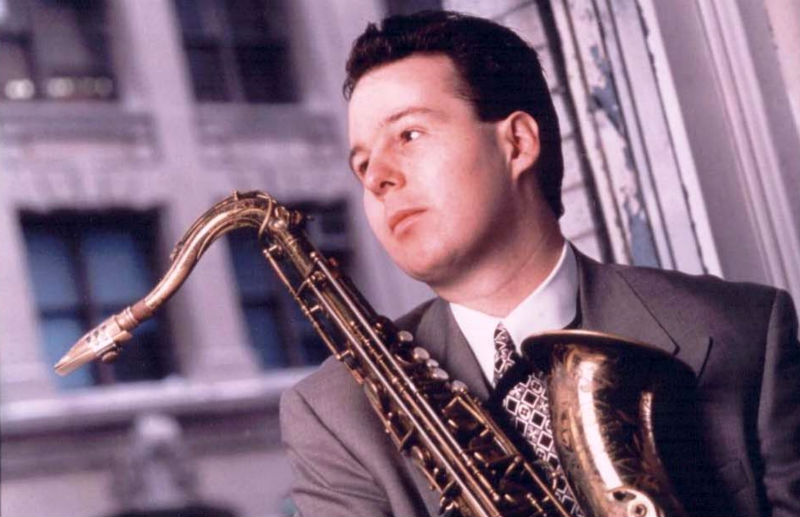
When Harry Allen was a sideman for drummer Oliver Jackson on long European tours, Jackson introduced the up-and-coming tenor saxophonist to the local promoter in every city they played. “He would say, ‘Remember this name, you’re going to want him,’” Allen recalls. Thirty years later, some of the same people book Allen regularly.
Now an internationally acclaimed jazz artist, Harry Allen swings into town with his quartet to play the Kerrytown Concert House on Wednesday, March 1. They will perform audience favorites from the Great American Songbook as well as a few new songs Allen recently wrote. Joining him on this date are Chicago-based guitarist Andy Brown and Ann Arbor veterans Paul Keller, bass, and Pete Siers, drums.
Get H.I.P. with Kahil El'Zabar's Ethnic Heritage Ensemble at Kerrytown Concert House
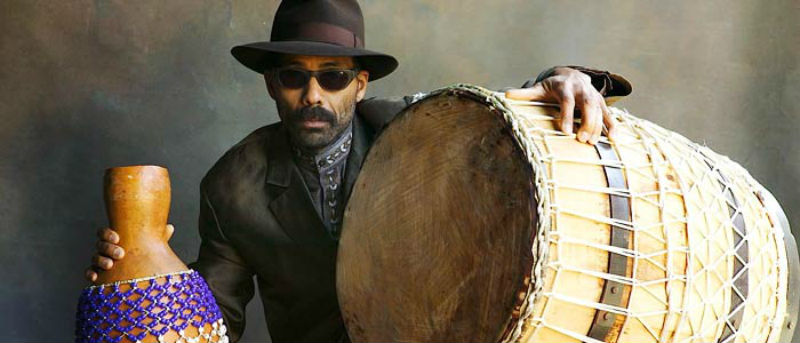
After graduating college and spending a year abroad in Ghana, Kahil El'Zabar came home to Chicago excited to tell his dad what he wanted to do with his life.
"I’m gonna play in a badass band," El'Zabar recalled telling him. "No bass, no piano, no guitar, no chromatic chordal instrument to set the tonic sensibility of the music."
His new vision called for a tonal center set by the "various rhythmic impulses" and "harmonic syntax of the music," African influences, and "urban contemporary expression" from his own experience.
"And he says, 'Man, it sounds hip, boy. But you’ll never make a living.'"
Strings Theory: Chris Eldridge and Julian Lage at The Ark
Guitarists Julian Lage and Chris “Critter” Eldridge have formidable track records in jazz and bluegrass, respectively. Lage has worked with Gary Burton, Fred Hersch, Nels Cline and more. Eldridge is widely known as a member of the innovative Punch Brothers.
So when Lage and Eldridge play as a duo -- on their new album Mount Royal, their 2015 gem Avalon and their 2013 five-track EP Close to Picture -- there’s a whole universe of music open to them, a wide range of shared tastes and enthusiasms.
Playing rare Martin acoustic guitars from 1937 (Eldridge) and 1939 (Lage), they survey the varied lineage of acoustic music and Americana while pursuing their own contemporary aesthetic. The music is improvisational, lyrical, whimsical, textural, and highly virtuosic. While Eldridge sang on much of Avalon, Mount Royal is mainly instrumental, though there are two vocal covers of bluegrass classics and even a reading of one of Eddie Vedder’s Ukulele Songs. We caught up with them shortly before their February 27 gig at The Ark.
The "Plague" Year: Hate Unbound celebrates album debut at Ypsi's Maidstone Theatre
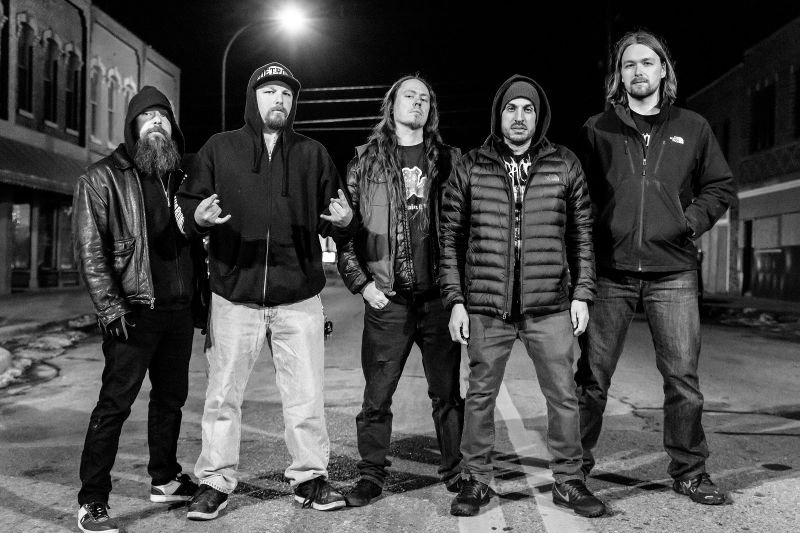
There’s a whole mess of influences on Hate Unbound’s debut album, Plague, which came out on the Finnish label Inverse Records. Reviewers have mentioned brutal bands (Lamb of God, Gojira, Hatebreed) along with thrashier groups (Exodus) and death metal pioneers (Death) -- but not enough have acknowledged Hate Unbound’s occasional laser-sharp deployment of twin-lead guitars, evoking classic Judas Priest and Thin Lizzy.
“I actually wanted to be KK Downing when I grew up,” said guitarist Daryl Mitchell, naming the ax partner of Glenn Tipton in Judas Priest. (Hate Unbound's other guitarist, William Cundiff, is Mitchell's Tipton.)
But don’t mistake Hate Unbound’s love of twin leads fool you: This southeastern Michigan group, which includes bassist Sean Demura and drummer Franklin "Foot" Hannah, is primarily about pummeling you with riffs, not tickling you with harmonized solos.
You'll be able to have your chest caved in by said riffs when Hate Unbound celebrates the release of Plague at the Maidstone Theatre in Ypsilanti on Saturday, February 18. We talked to Mitchell and vocalist Art Giammara about the Plague year, song meanings, and whether too many influences is too many.
While reading our chat, stream all of Plague at Zero Tolerance Magazine.


































